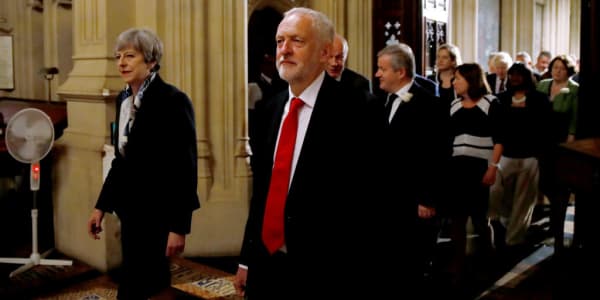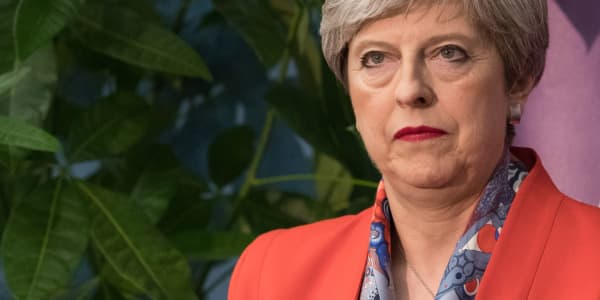The U.K. election has resulted in a hung parliament, with no party gaining the minimum number of seats – 326 out of a total 650 - required to form a majority government.
The result marks a major blow for incumbent Prime Minister Theresa May, who called the election just seven weeks ago in a bid to grow her slim parliamentary majority and advance with Brexit negotiations.
The Conservatives' majority was dashed overnight and the latest forecasts suggest the party will emerge with a total of 318 seats, compared with its former 331. Meanwhile, May's major opponent Labour leader Jeremy Corbyn celebrated a significant uptick in votes since the last election – forecast at 261 versus 232 in 2015 – though remained short of the total seats required to win.
The Scottish National Party (SNP), the next largest party, secured 35 seats, down from 2015's triumphant 55, while the Liberal Democrats saw a boost from 8 to 12 seats. Northern Ireland's Democrat Unionist Party gained 2 seats to secure a total of 10 and the U.K. Independence Party (UKIP), which fought for the Brexit referendum, lost their only seat.
So what happened?
Youth in revolt
Voter turnout this year was 69 percent, according to Ipsos Mori, up from 66.1 percent in 2015.
This uptick is thought to be largely down to a surge in youth voters, who typically are one of the Labour party's greatest voter demographics, and which goes some way in explaining the party's resurgence in popularity this year.
Corbyn has been credited with boosting Labour's appeal with young voters, especially within the 18-24 age bracket, due to his resolve to change politics and improve education, employment and housing policies for young people. In particular his pledge to scrap tuition fees likely proved popular with younger voters in this election.
Meanwhile, May's Conservatives, who are generally favoured by older voters, are thought to have alienated younger voters with their continued austerity measures and hard-line stance on Brexit. Youth voters largely voted to remain in the EU in last year's referendum.
Brexit
In an election which was called in a bid to strengthen EU negotiations, Brexit has loomed heavy and was as divisive as ever during the campaign trail.
May's signature "strong and stable" campaign pledged a hard Brexit, which has proved both desirable and unpopular in almost equal measures in this election.
Corbyn pledged to follow through with Britons' decision to leave the EU but vowed to provide parliament with a "meaningful vote" on the final terms of the deal. His party did not define what this vote would constitute.
The Liberal Democrats, led by Tim Farron, pledged a second referendum on EU membership during campaigning which proved to go some way in paring the losses suffered by the party in the 2015 election.
UKIP, which saw a boost in popularity in 2015, lost their only seat this year, suggesting that the party has lost its appeal after having succeeded in its aim to remove the U.K. from the EU.
The Scottish referendum
The SNP suffered a major defeat this year, with many voters switching their alliance to the Conservative party amid growing talks of a second referendum on Scottish independence.
Leader Nicola Sturgeon has vied vehemently for a so-called 'IndyRef2' but appeared to retreat on the idea somewhat during campaigning after her bid was rejected by May.
However, the hard-line stance appears to have proved unpopular at the polls with Scottish voters coming out in favour of remaining part of the U.K. The party's most significant losses were for Alex Salmond, former party leader, and Angus Robertson, deputy leader, who both lost their seats.
The party will now face a period of reconciliation. Leader of the Scottish Conservatives, Ruth Davidson, said on Friday that plans for another Scottish referendum were now dead in the water.
"There was one big issue in this campaign, that was Nicola Sturgeon trying to ram through a second independence referendum in March and the country's reaction to that. Indyref2 is dead," she said.





